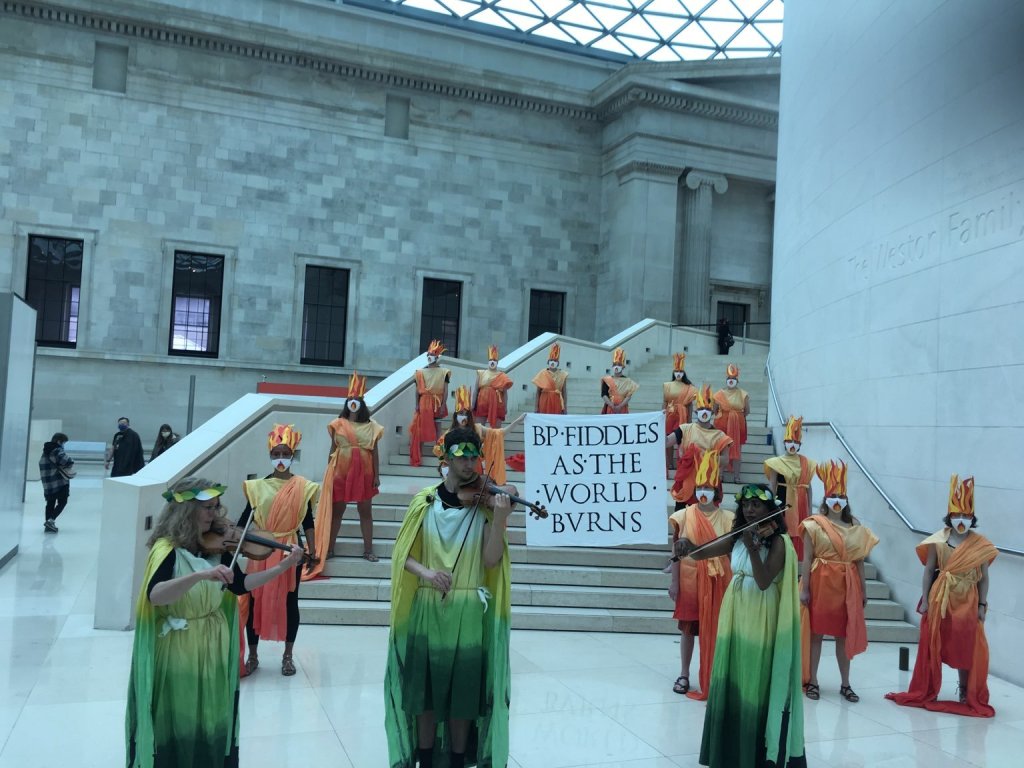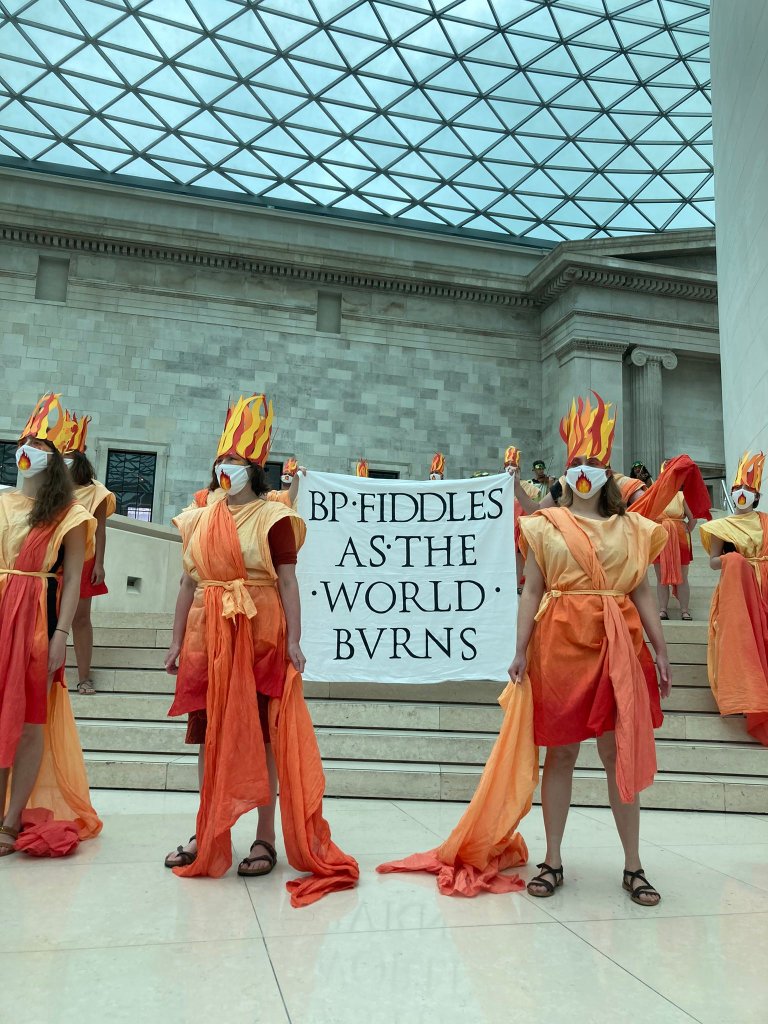
Today at 12.30pm, performers from the activist theatre group BP or not BP? began a dramatic musical protest inside the British Museum, to challenge BP’s sponsorship of the “Nero: The Man Behind The Myth” exhibition which opens next week. [1] Three professional violinists, dressed as the Emperor Nero but in the colours of the BP logo, are playing while a “Choir of Fire” dressed in flame-coloured togas chants a lament around them. The performance references the infamous myth that Nero “fiddled while Rome burned”, which the performers say is the perfect metaphor for BP’s failure to act in the face of the climate emergency.
The COVID-safe performance is unfolding, without permission, in the Great Court of the museum, with masked performers in three groups of 6, socially distanced from staff and visitors. All participants tested negative for COVID using lateral flow tests before the action.
Bayryam Bayryamali from BP or not BP? said:
‘Emperor Nero is famous for “fiddling while Rome burned”, so for BP to sponsor this exhibition is beyond ironic. The oil giant is continuing to extract fossil fuels as the world literally burns around it, while using its sponsorship of the British Museum to style itself as a responsible climate leader. While we are delighted that museums are reopening, it’s disappointing to see two of our most prominent – the British Museum and Science Museum – immediately launching oil-sponsored exhibitions when the climate crisis has only become more urgent during the pandemic. It’s time for these museums to follow the lead of so many other galleries and theatres and stop promoting this deadly industry.’


The musical protest draws a parallel between the British Museum’s attempts to rehabilitate the Emperor Nero as a ‘misunderstood’ ruler, and the museum helping BP to rehabilitate its image by sponsoring the exhibition. The performers accuse BP of using sponsorship to deflect attention away from its fossil fuel expansion plans in countries badly hit by fires linked to climate change, including Russia and Australia [2].
BP is also one of the main backers of the Southern Gas Corridor, a network of pipelines bringing fossil gas from Azerbaijan into Italy, where many of the objects in the Nero exhibition are from [3]. Campaigners point out how the company’s plans for a massive new gas project in Australia’s Burrup Hub [4] and for drilling in the Russian Arctic [5] conflict sharply with the company’s stated ‘ambition’ to reach net zero emissions by 2050 [6], and with the IEA’s announcement earlier this week that keeping warming to 1.5 degrees will require no new fossil fuel projects to be approved globally [7].

Anton Beneslavskiy, a firefighter in northern Russia, said:
“We’ve seen a terrifying increase in Siberian forest fires, thanks to the warming climate. BP and other oil companies bear huge responsibility for the climate crisis, and BP continues to make the climate problem worse by pushing to extract yet more oil and gas in Russia with Rosneft, even as parts of the country go up in flames. By working with BP, the British Museum is taking money that was forged from ashes, and is helping to pour more fuel on the fires of climate change.”
The voice of Julie Macken, a volunteer firefighter based in Sydney, Australia, is being played through speakers as part of the performance. She said:
“The Australian bushfires killed 34 people, they killed over a billion animals, they destroyed over 2000 homes, they burned millions of hectares of wild bush. We could not breathe in Sydney because of the smoke. I have never witnessed anything as terrifying or as devastating. Companies like BP shouldn’t be spending money on new oil and gas that we can’t afford to burn – they should be paying to fund the firefighting challenge that we’re going to be confronting for the next century. They should pay for it because they created it, by pushing the world into climate crisis.”
The performers argue that BP’s partnerships with cultural institutions such as the British Museum help the company to evade scrutiny over such contradictions, by presenting itself as a ‘good corporate citizen’ and thus purchasing a ‘social license to operate’ [8]. BP has also been accused of using its British Museum partnership to help broker new oil and gas deals [9].
Following the performance, BP or not BP? will head to the Science Museum to join youth climate strikers, led by UKSCN London, in protest at Shell sponsorship of that museum’s new climate exhibition [10]. Earlier this week, young activists launched a boycott of the exhibition over the Shell branding, and over 4000 people have already pledged not to attend the exhibition unless the Shell sponsorship is dropped [11]. The protest will see the hand-in of a petition calling on the museum to drop Shell, started by BP or not BP? and supported by 38 Degrees and 350.org which has been signed by over 57,000 people.[12]

The British Museum and Science Museum are two of the very few UK cultural institutions still sponsored by oil companies. In October 2019, the Royal Shakespeare Company dropped BP as a sponsor mid-contract and, just days later, the National Theatre declared a climate emergency and announced the end of its partnership with oil giant Shell. In March 2020 the Southbank Centre and British Film Institute confirmed that their corporate memberships with Shell would also not be renewed, and in May 2020 the National Portrait Gallery revealed it had dropped BP as a judge of the BP Portrait Award following protests from artists the previous year. It has also cancelled the next two BP Portrait Awards while the gallery is closed for refurbishment [13].
Today’s actions are part of a new wave of climate protest that is starting to emerge post-lockdown. This performance picks up the momentum from a 3-day mass creative protest at the British Museum carried out by BP or not BP? in February 2020 involving 1500 people, bringing a Trojan Horse into the museum’s courtyard and 50 activists staying overnight in the museum’s Great Court. The decision on whether to renew BP’s sponsorship of the museum will be taken in 2021. While the Covid-19 pandemic has made the financial situation for cultural organisations more precarious, the urgency of the climate crisis and the need for all organisations to act on it has also intensified.
Gianluca Maggiore from noTAP, a movement opposing the network of BP-funded pipelines from Azerbaijan to Italy, said:
“The link between BP and Nero is truly fitting: Nero is the perfect spokesperson for BP’s anti-climate policies. The history of humanity is full of scenes that repeat themselves. At this moment, BP watches the Earth burn from climate change, just like Nero watched Rome burn as he played his lyre. The planet is on fire because of climate change and the fossil emperors continue to play the lyre of their profits.”
Notes
[1] https://www.britishmuseum.org/exhibitions/nero-man-behind-myth
[2] Fires have been increasing in scope and severity in Siberia and in Australia, a trend that has been linked to the warming climate. See https://www.bbc.co.uk/news/science-environment-51742646 and https://www.nationalgeographic.co.uk/environment-and-conservation/2020/07/a-heat-wave-thawed-siberias-tundra-now-its-on-fire
[3] https://bankwatch.org/project/southern-gas-corridor-euro-caspian-mega-pipeline#key-facts
[4] The proposed Burrup Hub gas expansion has been described as “the most polluting fossil fuel project ever to be proposed in Australia”: https://www.theguardian.com/australia-news/2020/dec/21/wa-court-challenge-launched-against-huge-burrup-hub-gas-project
[5] BP is pushing to drill in the Russian Arctic, in partnership with Russian state oil company Rosneft. See https://www.ft.com/content/1834bfad-3f98-468a-80cb-455404f04f79.
[6] BP faced a significant shareholder rebellion at its AGM earlier this month over its refusal to set a concrete target for reducing its emissions in line with the Paris Climate Agreement. Instead, it only has a non-binding ‘ambition’ – which has been criticised for relying heavily on carbon offsetting and unproven carbon capture technologies. See https://www.behindthelogos.org/bpnetzero/ and https://www.reuters.com/business/sustainable-business/bp-climate-resolution-supported-by-fifth-shareholder-votes-2021-05-12/
[8] https://www.behindthelogos.org/sponsorship-and-social-license/
[10] https://www.facebook.com/events/462671524993283
[11] https://act.350.org/signup/boycott-science-museums-new-exhibition/
[12] https://you.38degrees.org.uk/petitions/demand-the-science-museum-drops-shell%5B13%5D See https://www.rsc.org.uk/news/we-are-to-conclude-our-partnership-with-bp, https://www.bbc.co.uk/news/entertainment-arts-49936748, https://www.theguardian.com/business/2020/mar/09/oil-shell-end-relationship-bfi-southbank-centre-british-film-institute-climate-crisis, and https://cultureunstained.org/2020/05/04/bp-dropped-as-judge-of-portrait-award-it-sponsors-after-23-years/
Children Thrown Under Oil Tankers Wheels .
By, British Museum Board.
LikeLike
Well done, highly imaginative! thank you for your time and effort.
LikeLike
More protests please. I was a member but have cancelled my membership in disgust. I would also like to protest. Any suggestions of what I should do, or who to write to?
LikeLike
Hi Michael, thanks so much for getting in touch and for your interest and support! We’ll drop you an email with more ways to get involved.
BP or not BP? x
LikeLike